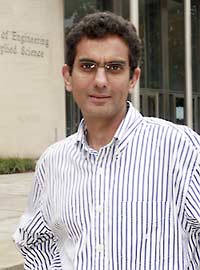Princeton University
Princeton Weekly Bulletin November 13, 2006, Vol. 96, No. 9 prev next current
- Page One
- • Eigenvalue-hugging ecologist seeks solutions in numbers
- • VP takes personal approach to human resources
- Inside
- • CIEE continues agenda with Malik at helm
- • Food choices explored at Nov. 16-17 conference
- • Program provides backup for caregiving needs
- • OSHA ensures access to records
- Almanac
- • Calendar of events
- • Nassau notes
- • By the numbers
- The Bulletin is published weekly during the academic year, except during University breaks and exam weeks, by the Office of Communications. Second class postage paid at Princeton. Postmaster: Send address changes to Princeton Weekly Bulletin, Office of Communications, Princeton University, 22 Chambers St., Suite 201, Princeton, NJ 08542. Permission is given to adapt, reprint or excerpt material from the Bulletin for use in other media.
- Subscriptions. The Bulletin is distributed free to faculty, staff and students. Others may subscribe to the Bulletin for $30 for the 2006-07 academic year (half price for current Princeton parents and people over 65). Send a check to Office of Communications, Princeton University, 22 Chambers St., Suite 201, Princeton, NJ 08542.
- Deadlines. In general, the copy deadline for each issue is the Friday 10 days in advance of the Monday cover date. The deadline for the Bulletin that covers Dec. 4-10 is Wednesday, Nov. 22. A complete publication schedule is available at www.princeton.edu/ pr/ pwb/ deadlines.html; or by calling (609) 258-3601.
- Editor: Ruth Stevens Calendar editor: Carolyn Geller Staff writers: Jennifer Greenstein Altmann, Eric Quiñones Contributing writers: Chad Boutin, Cass Cliatt Photographers: Denise Applewhite, John Jameson Design: Maggie Westergaard Web edition: Mahlon Lovett
CIEE continues agenda with Malik at helm

Sharad Malik, recently named Center for Innovation in Engineering Education
Princeton NJ — Sharad Malik, the George Van Ness Lothrop Professor in Engineering, has been named director of the University’s Center for Innovation in Engineering Education (CIEE).
The center began its second academic year with an ambitious agenda that includes two lecture series, an internship initiative and innovative curriculum offerings for undergraduates and graduate students.
H. Vincent Poor, dean of the School of Engineering and Applied Science, said that he has high expectations for the center under Malik’s stewardship.
“Sharad is a stellar talent in his field of research, in the classroom and as a leader,” said Poor, who led the center until being named dean earlier this year. “He embodies the very qualities that CIEE aspires to nurture in students.”
Malik said that the center’s primary role is to serve as an incubator for new ideas in engineering education. It is pioneering new interdisciplinary approaches to teaching engineering as well as new approaches to the teaching of core technological concepts to nontechnical majors.
“One of our goals is to help equip students — whether they are engineers or non-engineers -– with the skills they will need to be technologically astute leaders of the future,” Malik said. “We need to cultivate and grow the pathways between the engineering school and the greater University. All students on campus should have access to the rich opportunities that the engineering school offers, and engineering students should be working shoulder-to-shoulder with their colleagues elsewhere on campus as they tackle real-world problems.”
A Princeton faculty member since 1991, Malik focuses his research on the computer-aided design of electronic systems. He serves as associate director of the Gigascale Systems Research Center, a project jointly funded by the federal government’s Defense Advanced Research Projects Agency and the Microelectronics Advanced Research Corp. (an industry consortium) to address the long-term research challenges faced by the semiconductor industry. Malik has been honored three times with the Undergraduate Engineering Council’s Excellence in Teaching Award.
Among the center’s curriculum initiatives are:
• A course in community-focused design taught by Edward Coyle, the Kenan Visiting Professor of Distinguished Teaching and co-founder (with Princeton alumna Leah Jamieson, dean of engineering at Purdue University) of Engineering Projects in Community Service.
• A course titled “Faster and Higher: Hypersonics and Space Exploration” taught by Roger Burk, a visiting professor from West Point military academy.
• A course in patent law for engineers taught by Margaret Radin, a visiting professor from Stanford Law School who this year is a fellow in the Woodrow Wilson School’s Program in Law and Public Affairs.
• A course in innovation process management taught by Karl Zaininger, chairman and chief executive officer of Global Technology Management Partnerships and visiting professor of mechanical and aerospace engineering.
• An interdisciplinary course called EMP (Engineering, Math, Physics) led by Class of 1950 Professor of Chemical Engineering Pablo DeBennedetti, designed both to give freshmen early exposure to engineering and to integrate the teaching of math and physics in an engineering context.
• Writing seminars for engineering graduate students taught by Judith Swan, the Princeton Writing Program’s assistant director for scientific and technical writing.
The center also seeks to highlight popular existing courses, such as the “High-Tech Entrepreneurship” class taught by Ed Zschau, visiting lecturer with the rank of professor, and “Entrepreneurial Engineering,” taught by Dan Nosenchuck, professor of mechanical and aerospace engineering.
The center is sponsoring two lecture series this academic year: one titled “Leadership in a Technological World”; and another, in partnership with the Jumpstart New Jersey Angel Network, on “Technology Entrepreneurship.”
Malik emphasizes that the center’s mandate is to be experimental.
“Some initiatives will succeed and some will fail but we will always be trying new things,” he said.

